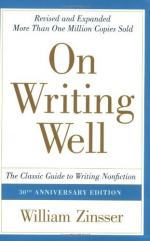|
This section contains 320 words (approx. 1 page at 400 words per page) |

|
Part III: Chapter 19 Humor Summary
The most powerful tool for a nonfiction writer is humor. Points that cannot be made in a straight manner, probably because they are too true or painful, can be brought out in a joking way. The author does not go into a current example of this, but the success of the fake news on television points to the value of humor when addressing serious national and international events.
Zinsser uses quotations from the following humor writers: George Ade, Don Marquis, S. J. Perelman, Woody Allen, Mark Singer, Garrison Keillor, Ian Frazier, and John Updike. He mentions E. B. White as another good humorist.
The rules for writing humor can be analyzed, but a better way to learn is to read good humorists and emulate their styles until the writer develops a unique approach. One drawback of humor...
(read more from the Part III: Chapter 19 Humor Summary)
|
This section contains 320 words (approx. 1 page at 400 words per page) |

|




